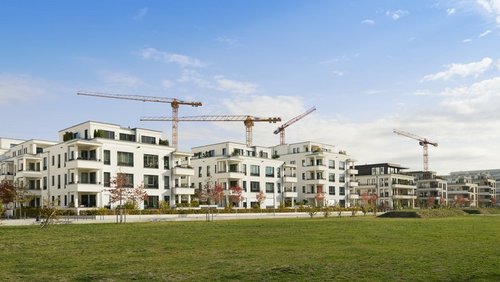Population growth in many of Germany’s major cities and metropolitan areas, and the resulting urgent growth in housing demand, are driving rapid construction of new residential properties in these markets.

Mobility and housing: New perspectives for urban development

Population growth in many of Germany’s major cities and metropolitan areas, and the resulting urgent growth in housing demand, are driving rapid construction of new residential properties in these markets.
It is becoming increasingly evident that in the short and medium term the additional demand for housing cannot adequately be met solely by lifting the potential for inner-city development, particularly in rapidly growing areas; it also requires the development of entirely new residential districts on the urban fringe. In order to avoid a growth of motorised individual traffic, it is vital that these new districts are well integrated into the existing public transport system. At the same time, this need for effective public transport must not pose excessive cost burdens for local governments, and hence hinder the emergence of these indispensable new neighbourhoods. The present study examines the prerequisites and conditions for the successful development of these new residential districts in metropolitan areas.
The central component of the study is an analysis of the empirical relationship between availability of public transportation and market prices of local residential properties. The study applies a spatial econometric hedonic price model to housing market data from three regions – Cologne, Karlsruhe and Stuttgart – in order to account for heterogeneity and location of individual properties on the market, thereby isolating price, quality and location factors. The results demonstrate that, where public transportation connections to newly developed urban districts have resulted in a travel time reduction of 30 minutes, local property prices have risen by 3.6 per cent in Karlsruhe, 5.4 per cent in Stuttgart, and 9.0 per cent in Cologne. The study therefore concludes that the provision of good public transportation connections in newly developed districts on the outskirts of metropolitan areas is associated with higher residential property prices, as well as lower mobility costs.
If one further juxtaposes these findings against the empirically determined cost parameters for various public transport construction projects, it is evident that the costs for the development of public transport are, from a societal perspective, outweighed by the resulting socio-economic benefits. This creation of value should provide justification to local governments not only in their land development decisions but also in their participation in the financing of public infrastructure projects.
The study illustrates how the successful development of new urban districts and their connection to public transport can be successfully realised and financed using three selected national and international case studies. The new neighbourhoods in the cities of Vienna, Copenhagen and Freiburg show how lively, diverse new neighbourhoods with a mix of housing and property usage forms can be created and financed, while at the same time providing the social and ecological benefits of good access to public transport and a resulting low proportion of motorised individual transport.

Mobility and housing: New perspectives for urban development

More on the topic

Options for affordable new construction
Due to the mix of higher interest rates and increased construction costs, new residential construction in Germany is in a very difficult situation.
IW
Housing for the Elderly
Many older people share the desire to be able to live independently in the familiar surroundings of their own home for as long as possible. Accidents and illness, however, can soon put an end to such autonomy.
IW